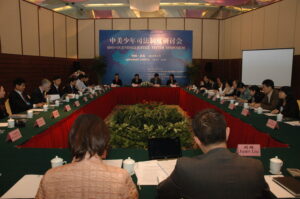SAN FRANCISCO (October 24, 2011) – Dui Hua, a nonprofit organization with more than 12 years of experience promoting respect for human rights in China, is expanding its work to improve the treatment of juveniles and women in detention, whose populations are increasing dramatically in China and worldwide. The organization, with a new bilingual logo, will continue to promote clemency and better treatment for political and religious prisoners even as it widens its mandate to help more at-risk detainees.

While their needs are very different, China’s political prisoners and its juvenile and women detainees face a common threat: vulnerability to discriminatory treatment. Broadening its work for at-risk detainees and deepening its research on criminal justice, Dui Hua intends to leverage its expertise to address changing prison populations. Recent initiatives show promising scope for development. In 2008, Dui Hua hosted the United States’ first juvenile justice delegation from China’s Supreme People’s Court. In 2010, Dui Hua continued the cooperation by sending a delegation of US judges and practitioners to China. The success of these endeavors can be seen in the draft revision of China’s Criminal Procedure Law, which introduces many rehabilitative concepts in a section dedicated exclusively to juveniles (for more information, read Dui Hua’s press statement). In 2011, Dui Hua put the spotlight on women detainees with publications examining the United Nation’s recently passed Bangkok Rules, the first internationally recognized minimum standards on the treatment of women in prison (read the article in Dialogue, Dui Hua’s quarterly newsletter), and the growing population of women in Chinese prisons (read the article in Dui Hua’s Human Rights Journal).
“Dui Hua started as a small organization with a big humanitarian mission. As the organization grows, the scope of its work needs to grow to ensure that more people benefit and that individuals vulnerable to systemic prejudice are heard,” said John Kamm, founder and executive director of Dui Hua.
The organization is also adopting a new mission statement that increases the emphasis on humanitarian treatment for at-risk detainees, while maintaining the importance of “dialogue,” which is the meaning of Dui Hua’s name in Mandarin Chinese (对话):
Dui Hua is a nonprofit humanitarian organization that brings clemency and better treatment to at-risk detainees through promotion of universally recognized human rights in well-informed, mutually respectful dialogue with China. Focusing on political and religious prisoners, juvenile justice, women in prison, and issues in criminal justice, our work rests on the premise that positive change is realized through constructive relationships and exchange.
Dui Hua will carry out its mission through advocacy, research, publications, community engagement, and a renewed focus on expert exchanges among criminal justice practitioners and scholars, China’s Supreme People’s Court, and US judges. This broadened approach and our key thematic areas will be reflected in a new Dui Hua website, to be launched later this year. As succinctly expressed in the organization’s new tagline, Dui Hua’s aim is: “Advancing rights through dialogue.”
About Dui Hua

“Dui Hua” (对话) means “dialogue” in Mandarin Chinese. Founded in April 1999 by former businessman John Kamm, Dui Hua is a nonprofit humanitarian organization that brings clemency and better treatment to at-risk detainees through promotion of universally recognized human rights in a well-informed, mutually respectful dialogue with China. As testament to its work, Dui Hua enjoys special consultative status with the UN Economic and Social Council and is the only independent NGO focusing on human rights in China to have such status.
Dui Hua has established productive working relations with officials in China, the European Union, the United States, and other countries that conduct human rights exchanges or dialogues with China. Fueled by a growing database that now includes more than 25,000 prisoners, the organization pioneered the use of prisoner lists as a means to raise individual cases during diplomatic encounters. Prisoner lists have since been used by more than a dozen countries and organizations during human rights dialogues and consultations.
